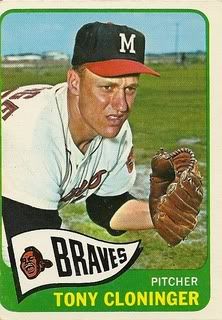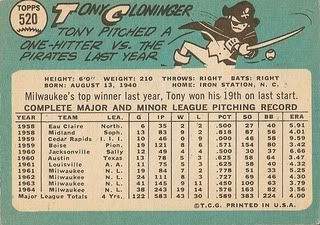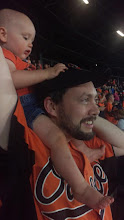
Fun facts about Tony Cloninger:
-Born in Lincoln County, NC, Tony signed with the Braves out of high school in 1958 for a whopping $100,000.
-He endured a nine-game losing streak with a 9.59 ERA at Class B Cedar Rapids in his second pro season, and was in the majors to stay at age 20 in 1961.
-1964 was his first season as a full-time starter and he led his club with a 19-14 record and a 3.56 ERA.
-Cloninger tossed a pair of one-hitters in his career: April 29, 1964 against the Pirates and September 11, 1965 at the Mets.
-Tony's greatest season was 1965, when he led Milwaukee with a 24-11 record. He also had a career-low 3.29 ERA. However, he did lead the N.L. with 119 walks and 22 wild pitches, and would do so again in 1966.
-He was a dangerous hitter throughout his career, batting .192 with 11 home runs overall. On July 3, 1966, he became the first National League player to ever hit two grand slams in a game and set a record for pitchers with nine RBI as the Braves crushed the Giants 17-3. Oh yeah, he also earned a complete-game victory.
-In mid-1968 Tony was traded to the Reds. He received his only postseason exposure with Cincinnati in 1970, starting the Game Three NLCS clincher but getting no decision (2 ER, 5 IP). The Orioles beat him in Game Three of the World Series (incidentally, pitcher Dave McNally's grand slam off of Wayne Granger broke it open), and he allowed a run in two innings of relief in Game Five as the O's clinched.
-Cloninger split 1972, his final active season, between the Cardinals and Atlanta's AAA Richmond squad. In parts of 12 big league seasons he was 113-97 with a 4.07 ERA.
-He spent a decade (1992-2001) as the Yankees' bullpen coach, and was the Red Sox' pitching coach in 2002-2003. He is now a player development consultant for Boston.
-Funny note: Tony was ejected from a game once during his 12 seasons as a player, and three times in 12 seasons as a coach!



Cloninger was a good pitcher in his time but was kind of anonymous. I never ever heard anyone speak of him or any media about him. I never would have known of him if it wasn't for baseball cards.
ReplyDeleteI remember the error on his 1970 card putting his pitching record superimposed on a batting background. Some proofreading!
Once again another guy who ends up with the franchise they started with.
He was in his prime when he was with The Big Red Machine and did not have much success...
ReplyDelete#1 - I imagine it was much harder to have a comprehensive knowledge of players on other teams back in the pre-Internet and cable days. Heck, every once in a while I still take a look at a National League player's stats at the end of a season and I'm surprised by what I see.
ReplyDelete#2 - More to the point, his prime came much earlier than it does for most players. He was out of the league by age 32.